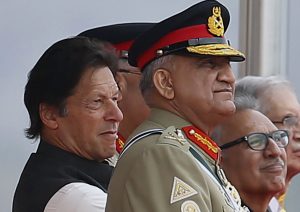A lawmaker from the ruling Pakistan Tehreek-e-Insaf (PTI) has introduced legislation in Pakistan’s parliament that, if passed, would criminalize criticism of the country’s military, Reuters reported earlier today. According to the report, the parliamentarian, Amjad Ali Khan, the head of the parliamentary standing committee on defense, said that the purpose of the amendment was “to prevent hatred and disrespectful behavior against the Armed Forces.” The amendment provides for jail time for any individual who “ridicules or brings into disrepute or defames” the country’s military, the report noted.
Pakistan ranked 144 out of 180 countries in the 2020 World Press Freedom Index (WPFI). Its military has been widely accused of aggressively pursuing journalists and other members of Pakistan’s civil society deemed to be working against its interests. Commenting on the state of press freedom in Pakistan and the role the country’s military plays in curtailing it, Reporters Sans Frontieres (RSF), the international group that publishes the annual WPFI, noted, “[t]he influence of this military ‘establishment,’ which cannot stand independent journalism, has increased dramatically since Imran Khan became prime minister in July 2018.”
In February this year, Pakistan introduced new laws to control social media. Pakistani activists have noted that these laws act as force multipliers to an already draconian system of speech controls aimed at stifling voices deemed anti-national by the military, long seen as the country’s praetorian guard. According to the RSF, three journalists have been killed so far this year in Pakistan.
In a high-profile case in 2018, an assistant editor of the Dawn, Cyril Almeida – widely seen as a respected, independent voice in Pakistan – was charged with treason after publishing an interview with then Prime Minister Nawaz Sharif in which Sharif indirectly suggested the involvement of Pakistan’s military in the November 2008 terrorist attacks in the Indian city of Mumbai. Another Pakistani journalist, Taha Siddiqui, fled to Paris after surviving a kidnapping bid in January 2018. Writing for the Washington Post in January last year, Siddiqui noted that “[a]fter the attack, several well-wishers told me that if I did not stop speaking about the Pakistani military, I would be shot dead the next time they came for me.”
Pakistan has dropped three places in the WPFI since last year, a development coterminous with Imran Khan’s deepening compact with the Pakistani army. When Khan, a flamboyant former cricketer, assumed office in 2018, the opposition derided him as a “selected prime minister,” suggesting that the military was behind his victory as it chose to pull the strings from behind a façade of nominal democracy. Ahead of the elections in July 2018, the New York Times noted “Pakistan’s powerful military establishment has mounted a fearsome campaign against its critics in the news media, on social networks, and in mainstream political movements.”
Who ultimately calls the shots in Pakistan has been again made clear during the ongoing COVID-19 crisis, which has seen the military take the lead in managing the country’s pandemic response. It is therefore unsurprising that the military is using civilian lawmakers of the ruling PTI to push legislation it favors through the parliament.

































